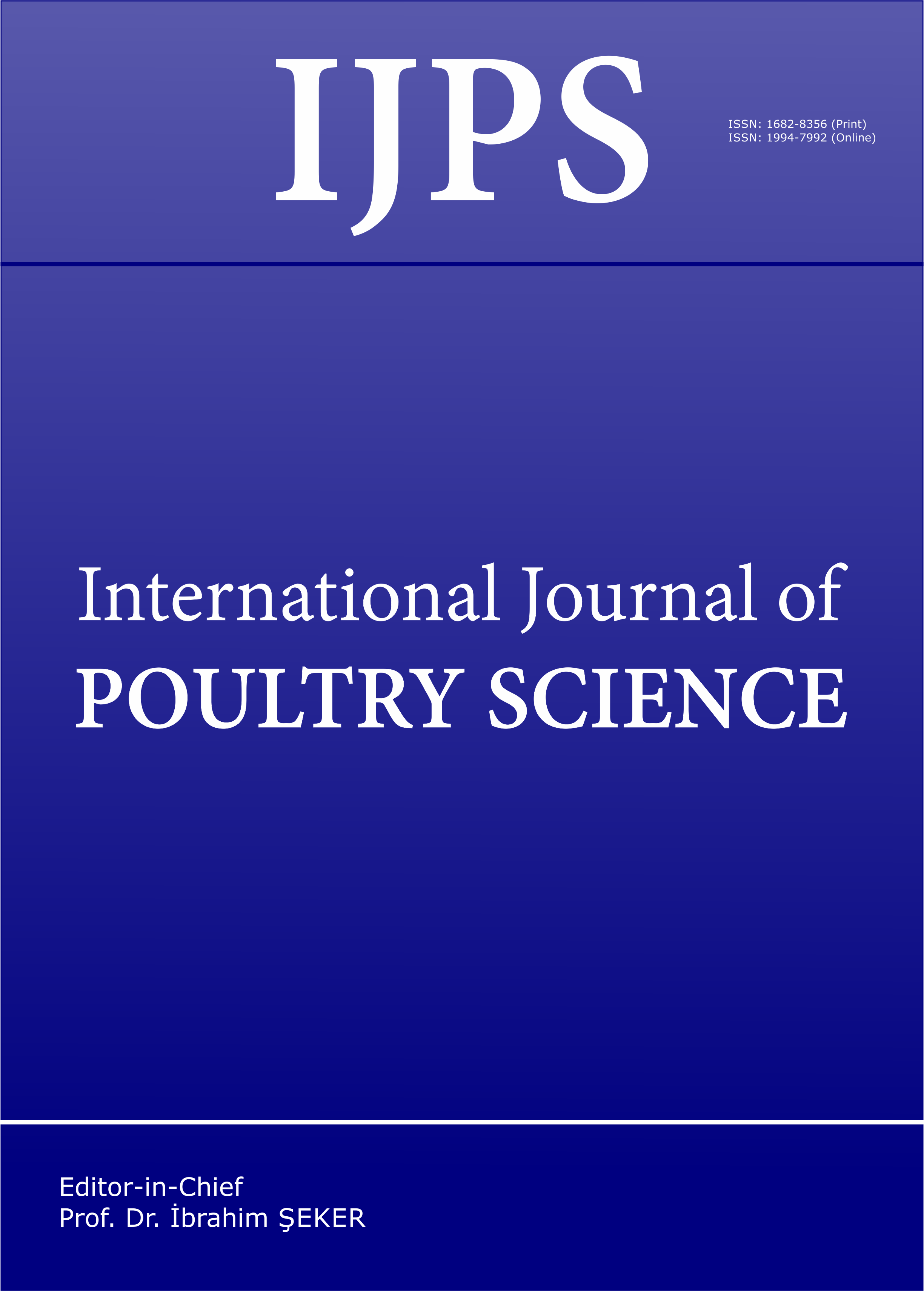Estimation of Inbreeding Rate in Kokok balenggek Chicken (KBC) Population under Ex-Situ Conservation
DOI:
https://doi.org/10.3923/ijps.2014.364.367Keywords:
Effective population size, inbreeding rate, Kokok balenggek chicken, Solok-IndonesiaAbstract
A survey was carried out in "Kinantan Bagombak" Breeding Farm (KBBF) in Solok City-Indonesia to estimate inbreeding rate on Kokok balenggek chicken (KBC). Estimation of inbreeding rate in a small and limited population of local chickens is very important to prevent inbreeding depression. KBC is a poultry genetic resource known as song fowl from West Sumatera Province, Indonesia. This research was aimed to calculate flock composition, effective population size (Ne) and inbreeding rate (ΔF) in KBC under ex-situ population. Census was the main research method. The results showed that total number of KBC at KBBF was 528 heads. Chicken flock composition of KBC was chick (31.63%), chicken grower (27.65%) and adult chicken (40.72%). Number of breeding males (Nm) was 54 heads and females (Nf) was 161 heads. Male and female ratio (Nm/Nf) was 1:3 (33.54%). Effective population size (Ne) was 162 heads. The rate of inbreeding (ΔF) calculated for the indigenous KBC flock considering the existing flock size and management practice was 0.0031 (0.31%) indicating that the population is not at the risk of extinction. It is concluded that inbreeding depression in KBC population at KBBF was not occurred.
References
Cervantes, I., F. Goyache, A. Molina, M. Valera and J.P. Gutierrez, 2008. Application of individual increase in inbreeding to estimate realized effective sizes from real pedigrees. J. Anim. Breed. Genet., 125: 301-310.
Falconer, D.S. and T.F.C. Mackay, 1996. Introduction to Quantitative Genetics. 4th Edn., Prentice Hall, Harlow, England, ISBN-13: 9780582243026, Pages: 464.
Flock, D.K., H. Ameli and P. Glodek, 1991. Inbreeding and heterosis effects on quantitative traits in a white leghorn population under long term reciprocal recurrent selection. Br. Poult. Sci., 32: 451-462.
Fumihito, A., T. Miyake, M. Takada, R. Shingu and M.T. Endo et al., 1996. Monophyletic origin and unique dispersal patterns of domestic fowls. Proc. Natl. Acad. Sci. USA., 93: 6792-6795.
Hagan, J.K., M. Bosompem and I.A. Adjei, 2013. The productive performance of local chickens in three Ecological Zones of Ghana. ARPN J. Agric. Biol. Sci., 8: 51-56.
Klemetsdal, G., 1998. The effect of inbreeding on racing performance in Norwegian cold-blooded trotters. Genet. Select. Evol., 30: 351-366.
Lariviere, J.M., J. Detilleux and P. Leroy, 2011. Estimates of inbreeding rates in ancient belgian chicken breed populations. Arch. Geflugelk, 75: 1-6.
Lariviere, J.M. and P. Leroy, 2007. Status and conservation of native poultry breeds in Belgium. Ann. Anim. Sci., 1: 87-91.
Maiwashe, A., K.A. Nephawe, R.R. van der Westhuizen, B.E. Mostert and H.E. Theron, 2006. Rate of inbreeding and effective population size in four major South African dairy cattle breeds. S. Afr. J. Anim. Sci., 36: 50-57.
Meuwissen, T.H.E. and J.A. Woolliams, 1994. Effective sizes of livestock populations to prevent a decline in fitness. Theoret. Applied Genet., 89: 1019-1026.
Okeno, T.O., T.M. Magothe, A.K. Kahi and K.J. Peters, 2012. Breeding objectives for indigenous chicken: Model development and application to different production systems. Trop. Anim. Health Prod., 45: 193-203.
Rusfidra, Y.Y. Tumatra, M.H. Abbas, Y. Heryandi and F. Arlina, 2014. Characterization of number of crow and qualitative marker of Kokok balenggek song fowl inside a captive breeding farm in Solok Regency, West Sumatera Province, Indonesia. Int. J. Poult. Sci., 13: 343-346.
Rusfidra, Y.Y. Tumatra, M.H. Abbas, Y. Heryandi and F. Arlina, 2012. Identification of biacoustics marker of Kokok balenggek song fowl inside a captive breeding farm in Agutalok solok regency, Indonesia. J. Peternakan Indonesia, 14: 303-307.
Smith, L.A., B.G. Cassell and R.E. Pearson, 1988. The effects of inbreeding on the lifetime performance of dairy cattle. J. Dairy Sci., 81: 2729-2737.
Spalona, A., H. Ranvig, K. Cywa-Benkos, A. Zanon and A. Sabbioni et al., 2007. Population size in conservation of local chicken breeds in chosen European countries. Arch. Geflugelkunde, 71: 49-55.
Thompson, J.R., R.W. Everett and C.W. Wolfe, 2000. Effects of inbreeding on production and survival in jerseys. J. Dairy Sci., 83: 2131-2138.
Wright, S., 1931. Evolution in Mendelian populations. Genetics, 16: 97-159.
Yakubu, A., 2010. Indigenous chicken flocks of Nasarawa State, North Central Nigeria: Their characteristics, husbandry and productivity. Trop. Subtrop. Agroecosyst., 12: 69-76.
Zahraddeen, D., T. Ahemen and P.I. Aliyu, 2011. On-farm studies on breeding characteristics of turkeys (Meleagris gallopavo) in parts of Jos Plateau, Nigeria. Adv. Applied Sci. Res., 2: 179-184.
Downloads
Published
Issue
Section
License
Copyright (c) 2014 Asian Network for Scientific Information

This work is licensed under a Creative Commons Attribution 4.0 International License.
This is an open access article distributed under the terms of the Creative Commons Attribution License, which permits unrestricted use, distribution and reproduction in any medium, provided the original author and source are credited.

